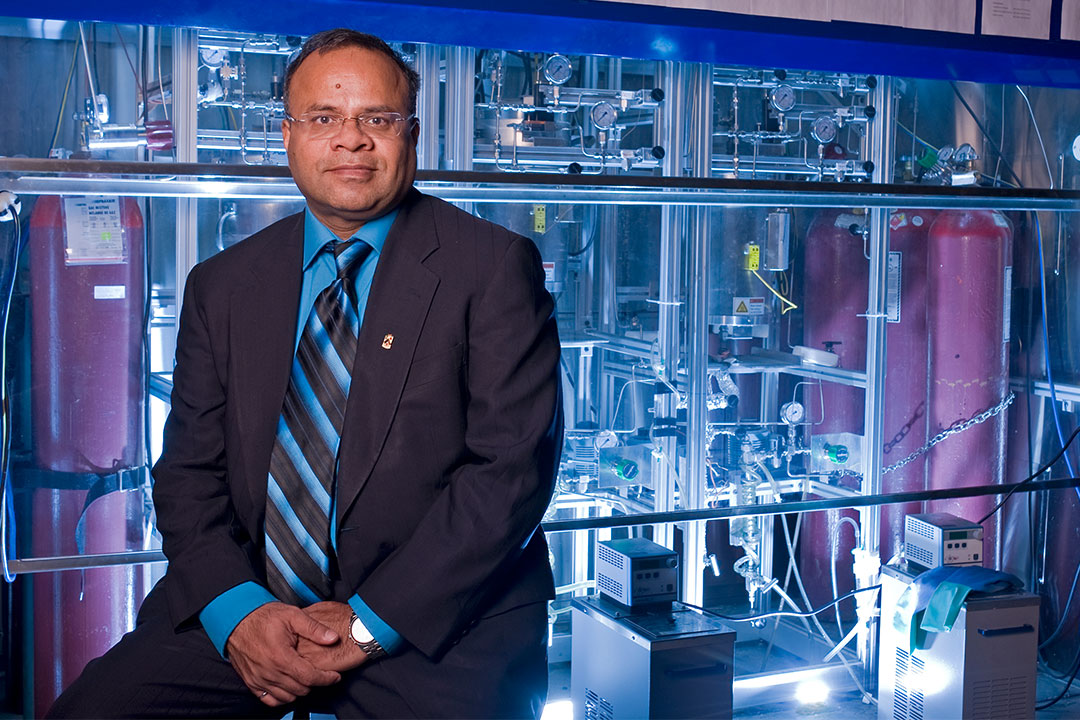
Dalai transforming restaurant waste into fuel
When most people look at discarded vegetable oil—browned and gritty from frying food—they likely see nothing more than waste.
By HenryTye GlazebrookBut to Ajay Dalai, a professor in the Department of Chemical and Biological Engineering, the cooking process creates a byproduct that has newfound potential as a source of fuel and biolubricant.
“We have made lots of contributions in biodiesel production from waste vegetable oil, such as the oil you get from restaurants,” Dalai said.
Transforming restaurant waste into fuel is only one of the projects thathas helped Dalai become a recognized member of his field, including a longstanding position as Canada Research Chair in Bioenergy and Environmentally Friendly Chemical Processing, and an induction to the Royal Society of Canada.
In 2016, he was elected to the Royal Society of Chemistry in the United Kingdom, a world-renowned community of chemists dedicated to advancing their field of science. It was this most recent appointment that led Dalai to do a lecture tour of the U.K., visiting the University of Edinburgh, Heriot Watt University, University of Aberdeen, Imperial College in London and Cambridge University, where he met with, learned from and shared his expertise with other chemists and engineers.
“The idea there was to discuss our contributions to the field of renewable energy and petroleum refining technology and also the environmental pollution control,” he said, adding that these are areas in which a group of U of S professors specialize. “You go and build on those strengths and learn more from some of the other fine people who are working in my field—bring them to the table and start working together with them.”
Dalai said these kinds of opportunities are vital to creating new opportunities to bring academics and researchers together.
“When I got this fellowship and travelled to the U.K., people really wanted to talk to me and collaborate with me and discuss with me about their facilities,” he said. “I think it opened up avenues to network with people from outside of Canada.”
While Dalai has worked on many different projects over the years that he believes contributed to his appointment with the Royal Society of Chemistry, he said his work with vegetable oil has attracted the most attention. The process is not entirely new for biodiesel production, but is largely limited on an industrial scale by the limited batch proportions on which it is reliant.
What sets Dalai and his team apart is their technique’s continuous mode of operation. Dalai has been working for 15 years on converting vegetable oil into biodiesel using solid acid catalysts and producing no byproducts outside of glycerol. For years, he has been focusing on the purification of this material and on the production of sustainable chemicals from glycerol. The result is a biodiesel that uses significantly less water and is much more environmentally friendly.
“You want to use less water in chemical processes to generate less waste water,” Dalai said. “This new method is a very environmentally friendly way of converting the waste oil into a diesel fuel product without using water.”
The resulting fuel is also much closer to being carbon neutral than other energy products. While energy sources such as potash and coal pull carbon out of the ground and release it into the air as new pollutants, biodiesel made from Dalai’s method releases carbon dioxide (CO2) that was originally stored in plants, which in turn absorb it from the air as part of the photosynthesis process.
“That is where the motivation is coming from: You take the carbon from the air, into the fuel, and by using it you are simply putting that CO2 back,” he said.
Ultimately, it is this push toward sustainability that Dalai said drives his research.
“When you look at our province and at Canada at large, we really want to show to the world that, though we are emitting a lot of CO2 per capita, we are aware of that problem and we are working towards finding technologies in-house which can help us to have low CO2 emissions down the road,” Dalai said.
“I think that’s a more international perspective, and we need to be a good citizen of the world by producing and using sustainable energy and chemicals.”

